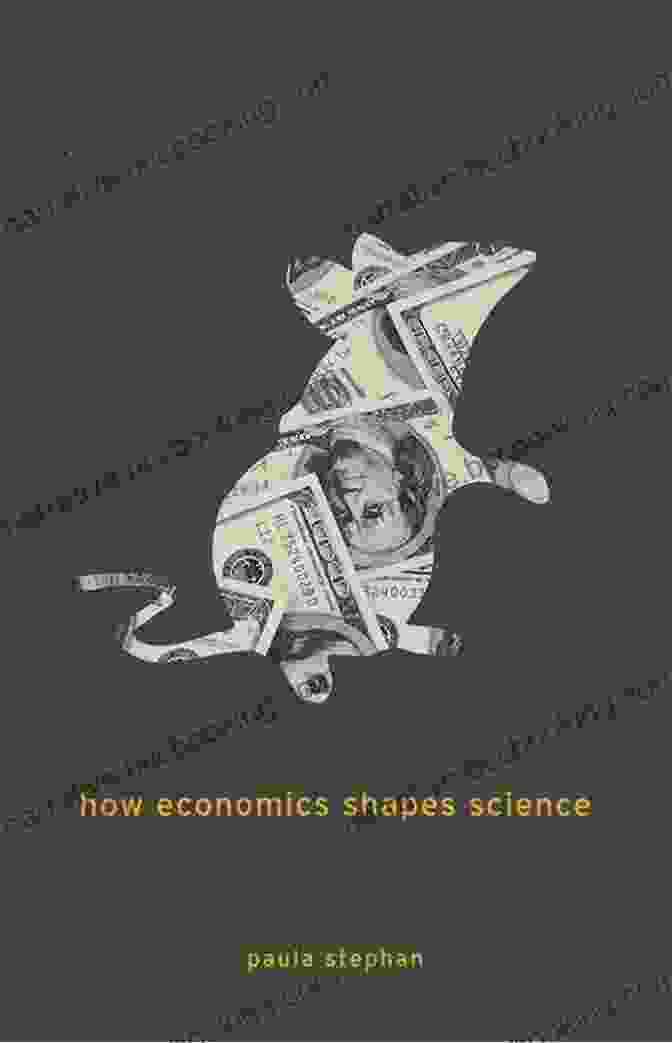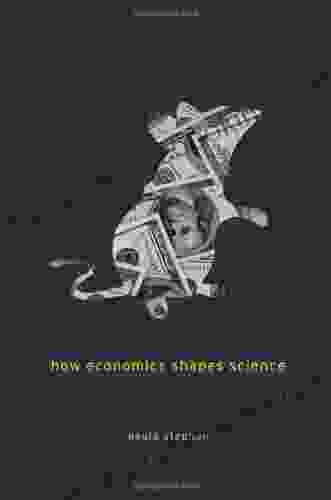Unveiling the Hidden Influence: How Economics Shapes Science with Charles Byrne


Science, often perceived as a realm of pure inquiry and intellectual curiosity, is far from immune to the influence of economic forces. In his groundbreaking work, "How Economics Shapes Science," Charles Byrne unravels the intricate relationship between economics and science, revealing how financial considerations profoundly impact scientific discovery, innovation, and the dissemination of knowledge.
Economic Roots of Scientific Discovery
Byrne argues that economic incentives play a pivotal role in shaping the direction of scientific research. Funding, whether from governments, private institutions, or philanthropic organizations, determines which scientific projects receive support and which languish in obscurity. This financial landscape inevitably influences the selection of research topics, methodologies, and even the interpretation of findings.
4.2 out of 5
| Language | : | English |
| File size | : | 4097 KB |
| Text-to-Speech | : | Enabled |
| Screen Reader | : | Supported |
| Word Wise | : | Enabled |
| Print length | : | 384 pages |
Take, for example, the pharmaceutical industry. Profit-driven companies prioritize research into drugs that address common ailments with a large potential market, resulting in a disproportionate focus on certain diseases while neglecting others that may affect smaller populations.
Research Agendas and Economic Interests
Beyond funding, economic factors also influence the setting of research agendas. Governments and corporations often fund research that aligns with their economic priorities or policy goals. This can lead to biased research findings, as scientists may consciously or unconsciously tailor their work to fit the expectations of their funders.
For instance, governments may prioritize research into renewable energy sources to promote environmental sustainability or national independence from fossil fuels. This emphasis can skew the research landscape, potentially diverting resources from other promising avenues of scientific inquiry.
Economic Barriers to Scientific Progress
Unfortunately, economics can also create barriers to scientific progress. Austerity measures or budget cuts can stifle funding for fundamental research, limiting the exploration of new ideas and breakthroughs. The commodification of scientific knowledge, through patents and restrictive licensing agreements, can further hinder the free flow of information and collaboration among researchers.
Dissemination of Knowledge and Economic Inequality
The dissemination of scientific knowledge is not immune to economic disparities. Access to scientific journals, conferences, and research infrastructure often comes at a hefty price, creating a divide between well-resourced institutions and those with limited funding. This inequality in access to knowledge can perpetuate disparities in scientific innovation and the application of scientific advancements.
Charles Byrne's "How Economics Shapes Science" offers a profound and timely examination of the undeniable influence of economics on the scientific enterprise. By shedding light on this often-overlooked relationship, Byrne challenges us to reconsider the motivations and consequences of scientific research.
This book is an essential read for anyone interested in the intersection of science, economics, and policy. It provides invaluable insights into the complex dynamics that shape scientific discovery, innovation, and the dissemination of knowledge. By understanding the economic underpinnings of science, we can better navigate the challenges and harness the opportunities presented by this intertwined relationship.
About the Author
Charles Byrne is a renowned economist and professor at the University of California, Berkeley. His research focuses on the economics of innovation, science funding, and the impact of technology on productivity. "How Economics Shapes Science" is his seminal work, widely regarded as a groundbreaking contribution to the understanding of the interplay between economics and scientific progress.
4.2 out of 5
| Language | : | English |
| File size | : | 4097 KB |
| Text-to-Speech | : | Enabled |
| Screen Reader | : | Supported |
| Word Wise | : | Enabled |
| Print length | : | 384 pages |
Do you want to contribute by writing guest posts on this blog?
Please contact us and send us a resume of previous articles that you have written.
 Book
Book Novel
Novel Page
Page Chapter
Chapter Text
Text Story
Story Genre
Genre Reader
Reader Library
Library Paperback
Paperback E-book
E-book Magazine
Magazine Newspaper
Newspaper Paragraph
Paragraph Sentence
Sentence Bookmark
Bookmark Shelf
Shelf Glossary
Glossary Bibliography
Bibliography Foreword
Foreword Preface
Preface Synopsis
Synopsis Annotation
Annotation Footnote
Footnote Manuscript
Manuscript Scroll
Scroll Codex
Codex Tome
Tome Bestseller
Bestseller Classics
Classics Library card
Library card Narrative
Narrative Biography
Biography Autobiography
Autobiography Memoir
Memoir Reference
Reference Encyclopedia
Encyclopedia Charles Wilson
Charles Wilson Catherine Huang
Catherine Huang Christina Y Weng
Christina Y Weng Chrissa Pagitsas
Chrissa Pagitsas Chiara Montenero
Chiara Montenero Catherine Kapphahn
Catherine Kapphahn Christopher Isherwood
Christopher Isherwood Chelsey Hill
Chelsey Hill Catie Czora
Catie Czora Chaitanya Yechuri
Chaitanya Yechuri Christine Bennett
Christine Bennett Chip Coffey
Chip Coffey Christopher J Berry
Christopher J Berry Chuck Dixon
Chuck Dixon Ciara Attwell
Ciara Attwell Christopher Lane
Christopher Lane Cheryl Probst
Cheryl Probst Christina Thompson
Christina Thompson Christa Mackinnon
Christa Mackinnon Christie Blatchford
Christie Blatchford
Light bulbAdvertise smarter! Our strategic ad space ensures maximum exposure. Reserve your spot today!

 Connor MitchellLipless The Monster: The Fish Was How Big? Unraveling the Mystery of the Deep
Connor MitchellLipless The Monster: The Fish Was How Big? Unraveling the Mystery of the Deep
 Manuel ButlerWitnessing the Enchanting World of Native American Tribes: An Exploration of...
Manuel ButlerWitnessing the Enchanting World of Native American Tribes: An Exploration of... Jamal BlairFollow ·12.5k
Jamal BlairFollow ·12.5k Billy FosterFollow ·12.5k
Billy FosterFollow ·12.5k Manuel ButlerFollow ·10.3k
Manuel ButlerFollow ·10.3k Ian PowellFollow ·8.9k
Ian PowellFollow ·8.9k Asher BellFollow ·14.8k
Asher BellFollow ·14.8k Jacques BellFollow ·9.3k
Jacques BellFollow ·9.3k Levi PowellFollow ·3.4k
Levi PowellFollow ·3.4k Miguel NelsonFollow ·11.7k
Miguel NelsonFollow ·11.7k

 J.R.R. Tolkien
J.R.R. TolkienEscape to the Culinary Paradise: "Truck Stop Deluxe In...
Prepare your palate for an...

 Andres Carter
Andres CarterA Taste of the Unusual: Discover the Enchanting World of...
Prepare to be captivated by "Cindy Supper...

 Nick Turner
Nick TurnerChild Obesity: Introducing the Idea of Healthy Weight
Child obesity is a serious...

 Junot Díaz
Junot DíazGoing Local: Your Ultimate Guide to Swiss Schooling |...
In the heart of Europe, Switzerland boasts a...

 Raymond Parker
Raymond ParkerSir Cumference and the Dragon of Pi: A Mathematical Fable
In the enchanting realm of...

 Thomas Powell
Thomas PowellUnveiling the Enchanting Realm of Curious Creatures from...
Russian folklore is a rich tapestry of...
4.2 out of 5
| Language | : | English |
| File size | : | 4097 KB |
| Text-to-Speech | : | Enabled |
| Screen Reader | : | Supported |
| Word Wise | : | Enabled |
| Print length | : | 384 pages |








